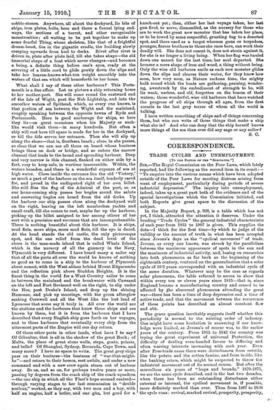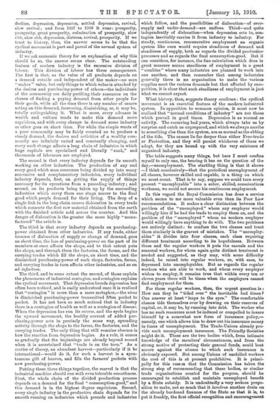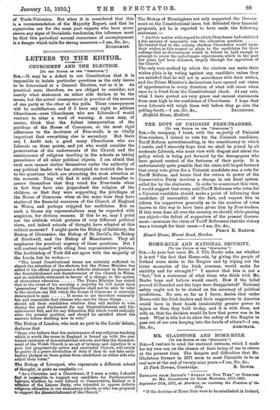CORRESPONDENCE.
TRADE CYCLES AND UNEMPLOYMENT.
tTo THE EDITOR or THE "SPECTATOR."]
SIR,—The Royal Commission on the Poor Laws, which lately reported, had the following as the second item in its remit :— " To enquire into the various means which have been adopted outside of the Poor Laws for meeting distress arising from want of employment, particularly during periods of severe industrial depression." The inquiry into unemployment, indeed, takes up a great part both of the evidence and of the special investigations which the Commission initiated, and both Reports give great space to the discussion of the subject.
In the Majority Report, p. 328, is a table which has not yet, I think, attracted the attention it deserves. Under the heading "Trade Cycles" the general industrial characteristic of each year from 1815 to 1907 is given. This supplies the data—I think for the first time—by which to judge of the validity or the amount of truth in what has been accepted since Jevons's days as the "cyclical movement" of trade. Jevons, as every one knows, was struck by the parallelism between the maximum appearance of spots in the sun and the maximum of industrial activity, and, basing on researches into both phenomena as far back as the beginning of the eighteenth century, ventured on the generalisation that a solar cycle of 10.3 years corresponded with an industrial cycle of the same duration. Whatever may be the case as regards solar phenomena, the table referred to seems to show that within every ten or eleven years since 1815—that is, since England became a manufacturing country and ceased to be affected by Jhe abnormal phenomena attending the great war—there has been a time of deep depression and a time of active trade, and that the movement between the recurrence of these points has described an almost constant flow and ebb.
The grave question inevitably suggests itself whether this periodicity is normal to the existing order of industry. One might have some hesitation in answering if our know- ledge were limited, as Jevons's of course was, to the earlier years of the century. From 1815 to 1842 the country was trying the great experiment of universal Protection, the difficulty of dealing even-handed favour to differing and often warring interests increasing with each year. Even after Free-trade came there were disturbances from outside, like the potato and the cotton famine, and from inside, like the banking crises, which might be suspected to throw the industrial movement out of its normal course. But after the marvellous six years of " leaps and bounds," 1870-1875, we see the same cycle described, and in the last two decades, when there has been no outstanding disturbance either external or internal, the cyclical movement is, if possible, more definitely marked than ever. Thus from 1887 to 18)6 the cycle runs : revival, marked revival, prosperity, prosperity, decline, depression, depression, settled depression, revival, slow revival ; and from 1897 to 1906 it runs : prosperity, prosperity, great prosperity, culmination of prosperity, slow ebb, slow ebb, depression, distress, revival, prosperity. If we trust to history, then, the answer seems to be that the cyclical movement is part and parcel of the normal system of industry.
If we ask economic theory for an explanation of why this should be so, the answer seems clear. The outstanding feature of modern industry is the excessive division of labour. This division of labour has three consequences. The first is that, as the value of all products depends on a demand outside and independent of the maker—no man " makes " value, but only things to which value is attached by the desires and purchasing-power of others—the individuals of the community are daily perilling their resources on the chance of finding a paying demand from other people for their goods, while all the time there is any number of causes acting on this demand, increasing, diminishing, or, it may be, totally extinguishing it. What is more, every advance in wealth and culture tends to make this demand more capricious, and with every change in demand some industry or other goes on short time. For while the simple wants of a poor community may be fairly counted on to produce a steady demand, the desires and activities of a wealthy com- munity are infinitely varied and constantly changing, and every such change affects a. long chain of industries in which huge capitals are specialised and literally "sunk," and thousands of labourers are employed.
The second is that every industry depends for its smooth working on other industries. The production of any and every good which man consumes being divided up into many successive and complementary industries, every individual industry depends, first, on getting the supply of things necessary for its operations from a preceding industry; and second, on its products being taken up by the succeeding industries which carry them one stage nearer to the final good which people demand for their living. The drop of a single link in the long chain causes dislocation in every trade which connects the first raw material obtained from the earth with the finished article sold across the counter. And this danger of dislocation is the greater the more highly "manu- factured " the article is.
The third is that every industry depends on purchasing- power obtained from other industries. If any trade, either because of dislocation of supply or change of demand, goes on short time, the loss of purchasing-power on the part of its members at once affects the shops, and to that extent puts the shops, and through them the factories, the farms, and the carrying trades which fill the shops, on short time, and the diminished purchasing-power of such shops, factories, farms, and carrying trades in turn affects other industries, and so on ad infinitum.
The third, and to some extent the second, of these explain the phenomena of industrial contagion, and contagion explains the cyclical movement. That depression breeds depression has often been noticed, and is easily understood once it is realised that " contagion " is more than a mere metaphor,—the virus is diminished purchasing-power transmitted fi'bm pocket to pocket. It has not been so much noticed that in industry there is a contagion of health as well as a contagion of disease. When the depression has run its course, and the cycle begins the upward movement, the healthy current of added pur- chasing-power acts in precisely the same way, spreading activity through the shops to the farms, the factories, and the carrying trades. The only thing that still remains obscure is how the reaction from depression begins. As a rule, it comes so gradually that the beginnings are already beyond record when it is ascertained that " trade is on the turn." As a matter of theory, an abundant harvest--particularly if it be international—would do it, for such a harvest is a spon- taneous gift of heaven, and fills the farmers' pockets with new purchasing-power.
Putting these three things together, the marvel is that the industrial machine should run with even tolerable smoothness. First, the whole chain of the divided production process depends on a demand for the final " consumption-good," and this demand is in the highest degree capricious. Second, every single industry in the productive chain depends for its smooth running on industries which precede and industries
which follow, and the possibilities of dislocation—of over- supply and under-demand—are endless. Third—and quite independently of dislocation—when depression sets in, con- tagion inevitably carries it from industry to industry. For steady, continuous, remunerative employment an organic system like ours would require steadiness of demand and steadiness of supply, both as regards the divided production processes and as regards the final consumption-good. But ii one considers, for instance, the fine calculation which does in great measure secure steadiness of employment in a great " combine" where many industries are planned to work into one another, and then remember that among industries generally there is no organisation to make the various supplies meet the various demands but that effected by com- petition, it is clear that such steadiness of employment is just what we cannot expect.
What history, then, suggests theory confirms : the cyclical movement is an essential feature of the modern industrial system. In opposition to common opinion, it must now be realised that "normal conditions of industry" are not those which prevail in good times. Depression is as normal as activity. The recurring bad years, which always take us by surprise and catch us unprepared, and which we always ascribe to something else than the system, are as normal as the ebbing of the tide. The causes lie far deeper than either Free-trade or Protection, and they will persist whichever of these we adopt, for they are bound up with the very existence of organised industry.
The table suggests many things, but here I must confine myself to only one, the bearing it has on the question of the day,—unemployment. The startling thing is that it shows —I think conclusively—that the periodical unemployment of all classes, however skilled and capable, is a thing on which we must count. That is to say, suppose we could turn every present " unemployable" into a sober, skilled, conscientious workman, we could not secure his continuous employment.
In this regard the Royal Commission has done a service which seems to me more valuable even than its Poor Law recommendations. It makes a clear distinction between the problem of the "unemployed" whom any employer would willingly hire if he had the trade to employ them on, and the problem of the " unemployed " whom no modern employer would willingly have anything to do with. The two problems are entirely distinct : to confuse the two classes and treat them similarly is the gravest of mistakes. The " unemploy- ables " it divides into four classes, each class requiring different treatment according to its hopefulness. Between these and the regular workers it puts the casuals and the seasonal workers, for whom again quite distinct treatment is needed and suggested, as they may, with some difficulty indeed, be raised into regular workers, or, with ease, be depressed into unemployables. But as regards the regular workers who are able to work, and whom every employer wishes to employ, it remains true that within every ten or eleven years there will be times when the employers cannot find employment for them.
For these regular workers, then, the urgent question is : How can they be " tided over " the inevitable bad times P One answer at least " leaps to the eyes." The comfortable classes tide themselves over by drawing on their reserves of capital, or, it may be, by running into debt. The worker who has no such resources must be induced or compelled to insure himself by a somewhat new form of insurance policy,— namely, one which allows him to draw out his insurance money in times of unemployment. The Trade-Unions already pro- vide such unemployment insurance. The Friendly Societies might do it. These are the two bodies which, from intimate knowledge of the members' circumstances, and from the strong motive of protecting their general funds, could best secure against the abuses to which such insurance is obviously exposed. But among Unions of unskilled workers the cost of this is at present prohibitive. It is princi- pally for this reassn that the Commission has taken the strong step of recommending that these bodies, or similar trade organisations created for the purpose, should be encouraged to establish and maintain unemployed benefit by a State subsidy. It is undoubtedly a very serious propo- sition to make, not so much that it involves another drain on the already burdened finances of the State as that it is, to put it frankly, the first official recognition and encouragement of Trade-Unionism. But when it is considered that this is a recommendation of the Majority Report, and that its signatories are for the most part experts who have never shown any signs of Socialistic tendencies, the inference must be that this periodical normal recurrence of unemployment is a danger which balls for strong measures.—I am, Sir, &c.,
ECONOMIST.








































 Previous page
Previous page